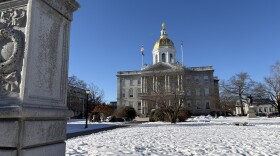This is a time of year when heating bills usually go up, and some residents consider alternative energy sources for their heating.
Proponents of geothermal heat say their systems ought to be a bigger part of New Hampshire's energy landscape.
The prospects for geothermal - that's the topic of this month's Science Café discussion, which takes place Wednesday, January 21st, at Killarney's Pub in Nashua.
The moderator is David Brooks, who writes the weekly Granite Geek science column for the Nashua Telegraph and GraniteGeek.org. He joined All Things Considered with a preview of the discussion.
When I think of geothermal I think of hot water and heat from an underground heat source, like a volcano. But what we’re talking about here is something different.
That's right, unfortunately - it'd be very cool to have volcanoes around here. We're really talking about heat pumps, which is a term that older New Englanders will remember with horror, because heat pumps were pushed in the 70s and 80s as a way to lower your heating costs by drawing heat out of the air. They found there isn't enough heat in the air in New England in wintertime for them to really work.
This generation of heat pumps - which has been around for a while, but has really come to prominence in the past 5-10 years as part of the whole alternative energy push - draws heat out of the ground, where the temperature is pretty consistent, around 50-55 degrees Fahrenheit. They can use that to cool your house in the summertime, which makes sense. What's weird is that they can also use 50 degree water to heat your house in the wintertime.
The water doesn't have to be all that hot to heat your house?
It doesn't, as long as the technology is right, and that's what the Science Café is going to be about. That's why we're holding the Café - there's an awful lot of confusion about this technology.
It uses the physics of phase change, which is when a substance goes from a gas to a liquid, or vice versa. It releases or absorbs an enormous amount of energy doing this - that's the way your refrigerator works. There's a compressor that squishes this liquid in the coils - it used to be freon, I don't know what it is now - and in the process it makes a phase change, and it absorbs or releases lots of heat. It moves heat.
And so what happens is water comes into your house at about 50 degrees, and after some of the heat's sort of been pumped out it goes back into the ground at about 40 degrees. That difference is used to help heat your house. There's cost issues and those things as well as the science and the technology.
And the question of how big a role this could play in the energy system. We've been having cold weather and concerns about natural gas pipeline capacity in the region. People are looking to save money...
They're looking to save money, they're looking to generate more electricity locally. This is sort of a distributed energy - not entirely, because you still need electricity to make the pump run. Unless you're producing your own electricity, you're still powered by the grid. But it definitely reduces the amount of external energy source you need to bring into your house to heat it. It's a part of the equation - I'm not sure how big a part it is. That's part of the reason why we're having the Café, so we can find out.
By the way, we will be talking about the fact that there is a small possibility of one source of real - hot rock, they call it - geothermal in New Hampshire, up in the Conway area. There was a study from MIT a while back which said that it might happen there, but it's not from volcanoes. It's actually from radioactivity, because granite produces natural radioactivity, and if you have enough of that low-level radioactivity happening it produces a lot of energy. If you can drill miles down below Conway, there's enough granite of a certain type below that it just might be able to produce real hot rock geothermal from radioactivity. That's never going to happen because it would cost too much, but it's cool to think about.
And "hot rock geothermal" is a pretty great term.
I think this is where one of us makes a joke about how it would be a great name for a band.








